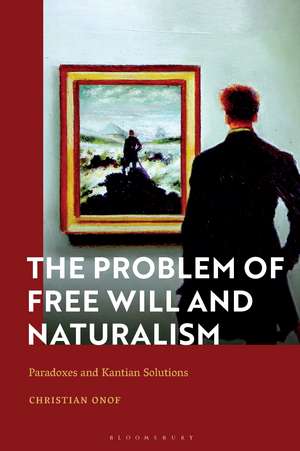The Problem of Free Will and Naturalism: Paradoxes and Kantian Solutions
Autor Christian Onofen Limba Engleză Hardback – 21 feb 2024
Preț: 511.07 lei
Preț vechi: 731.59 lei
-30% Nou
Puncte Express: 767
Preț estimativ în valută:
97.81€ • 101.04$ • 81.40£
97.81€ • 101.04$ • 81.40£
Carte tipărită la comandă
Livrare economică 25 martie-08 aprilie
Preluare comenzi: 021 569.72.76
Specificații
ISBN-13: 9781350425361
ISBN-10: 1350425362
Pagini: 256
Dimensiuni: 156 x 234 mm
Greutate: 0.54 kg
Editura: Bloomsbury Publishing
Colecția Bloomsbury Academic
Locul publicării:London, United Kingdom
ISBN-10: 1350425362
Pagini: 256
Dimensiuni: 156 x 234 mm
Greutate: 0.54 kg
Editura: Bloomsbury Publishing
Colecția Bloomsbury Academic
Locul publicării:London, United Kingdom
Caracteristici
Identifies key issues in contemporary naturalist responses to the problem of free will, presenting a coherent Kantian solution
Notă biografică
Christian Onof is Honorary Research Fellow in the Department of Philosophy at Birkbeck College, UK and Reader at Imperial College London, UK.
Cuprins
Introduction1. Free Will and Compatibilism2. Kant's Idealism and Compatibilism3. Libertarian theories of free will4. Kant's resolution of the Third Antinomy5. Freedom in Kant's Practical Philosophy6. The Temporal Dimension of Free Agency7. The Kantian Solution and its RequirementsBibliographyIndex
Recenzii
This is an original and impressive book. Onof both advances our understanding of freedom in Kant, and brings Kant into dialogue with contemporary work on free will. If you are interested in either of these topics, this book will provide much to think about. It's clear, comprehensive, and full of serious thought on a crucial topic.
The particular strength of Onof's book is its exceedingly beneficial strategy of harnessing the resources of the historiography of philosophy. He expounds Kant's approach to solving the free will issue in all its perplexing difference to contemporary orthodoxies, and then shows how Kant's peculiar position manages to address various flaws of them.
The particular strength of Onof's book is its exceedingly beneficial strategy of harnessing the resources of the historiography of philosophy. He expounds Kant's approach to solving the free will issue in all its perplexing difference to contemporary orthodoxies, and then shows how Kant's peculiar position manages to address various flaws of them.
